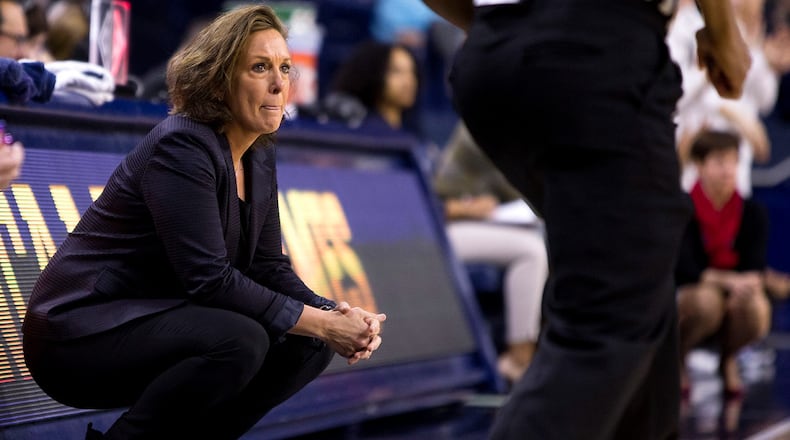On March 26, Georgia Tech athletic director Todd Stansbury fired women’s basketball coach MaChelle Joseph after determining that he could not ensure the well-being of team members with her as coach. In the days since, drastically divergent portraits of the coach have emerged.
On one side, supporters of the coach, including former players and staff, as well as parents of players, have described her as demanding, fair, passionate and loyal. On the other, a third former Yellow Jackets player has released a statement that sought to corroborate the complaints from players in the investigative report into Joseph’s conduct that led to Stansbury’s decision to fire her – that she was abusive, demeaning and manipulating.
Joseph and Tech seem on a path heading to a legal confrontation, as the coach who led the Jackets to seven NCAA tournament berths and the most wins in school history has claimed that she was fired as retaliation for raising concerns about disparities between her team and the men’s team. Her attorneys assert that she “will be fully vindicated.”
The stark contrast in perspective between the two sides – provided from people who worked and played for the same person, some of them together – is a reflection of the chasm that separates Joseph and her former employer of the past 18 years, 16 as head coach.
On Tuesday, attorneys representing Joseph released statements, social-media messages and text messages from about 25 former players, staff and parents in defense of Joseph. That followed the release of a statement by a third former Tech player, the daughter of NBA legend Earl Monroe, to challenge Joseph’s response to the investigation that she was not abusive, but demanding and intense. Her statement was provided by the same attorney representing former Tech player Niesha Butler, who has alleged that Joseph sexually harassed her while on a team road trip in January 2002.
In the statement, Maya Monroe said that Joseph threw basketballs and clipboards at players and assistant coaches, manipulated team members against each other and once refused to let two team members board the bus after a game at Duke and left them at the arena. She said that after her parents contacted Joseph to express their concerns about her coaching and communication approach, Joseph told the entire team “how selfish a player I was due to the fact that my parents had contacted her.” Lastly, Monroe said that “I was ostracized and often made to feel uncomfortable by coach Joseph as a consequence of my sexual orientation.”
According to Tech media guides, Monroe played for Tech for three seasons (2001-04), which were Joseph’s two seasons as an assistant at Tech and first as head coach. Responding to Monroe’s statement, Joseph’s attorney Lisa Banks wrote “Ms. Monroe’s written comments about Coach Joseph at the time she was a player reveal exactly what we have said, that MaChelle Joseph was an effective and supportive coach. Ms. Monroe appears to have different motivation now.”
Included with the statement was a copy of a page from a Tech recruiting publication from the time of Joseph’s hire as head coach in which Monroe was quoted as saying, “Coach Joseph’s commitment and enthusiasm are exactly what we need in our program.”
Monroe’s charges of abuse painted a picture drastically different from one provided by Kaela Davis, a former star player (2013-15), who said that Joseph was as interested in her personal and academic development as her growth as a player. She said Joseph helped her pursue an electrical engineering degree by doing things such as adjusting practice schedules around lab classes.
Even after Davis transferred after two seasons because of her desire to be in a more competitive environment (South Carolina, where she won a national championship), the two remained on good terms. Joseph, Davis said, even invited her to a practice early this past season to speak to a freshman who had been struggling. It was an example of how Joseph sees players’ potential and strives to bring it out, Davis said.
Asked about the allegations of abuse, Davis responded, “I mean this in the nicest possible way, but I think it was hilarious.”
Austin Kelly, who served as a graduate manager for the team this past season and played football at Duke, said that “nothing that went on this year would have raised alarms for me. If boundaries were overstepped, I felt comfortable enough with coach Joseph I would have stepped in and said something.”
Kelly said he felt it was “possible” that the investigation was manipulated to achieve a particular result, as Joseph’s attorney alleged, saying certain information he provided that supported Joseph was “looked over.”
Kasha Terry (2002-06), a captain of Joseph’s second and third teams, wrote in a statement that “at no time” did she feel abused mentally or physically. While acknowledging days where she cried, she said she believed she was “being pushed to be everything that I was as a player” by Joseph.
Aaliyah Whiteside (2012-16), another multi-year captain, described Joseph as a “fearless leader whom I will forever be grateful for” and someone she continues to call for advice.
“Coach Jo created an environment for me to learn what I would face in the real world,” Whiteside wrote. “I appreciate her toughness, her holding me accountable and her pushing me to be the best version of myself.”
Tyaunna Marshall (2010-14), Tech’s all-time leading scorer, said in a statement that Joseph was like a second mother to her and that her days playing for Joseph “were nothing short of amazing.” She called Joseph “someone who pushed me to be the best version of myself as a person and a player over those four years.”
At a time when the rest of the women’s college basketball world anticipates this weekend’s Final Four in Tampa, Fla., Tech instead finds itself in a very different competition, one with no clear end in sight.
About the Author
Keep Reading
The Latest
Featured




